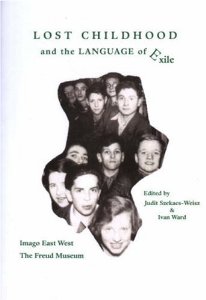Lost Childhood and the Language of Exile
Conference 12-13 May 2011
"Lost Childhood and the Language of Exile" was an inter-disciplinary event jointly organised with Freud MUseum in London and IMAGO Multilingual Psychotherapy Centre. It was the second of three major conferences in Budapest, London and Paris focusing on the theme of Mother-tongue and Other Tongues, and organised to coincide with the European Year of Languages.
The last century has seen waves of migration in Europe. There were the refugees who escaped persecution and threats to their lives, traumatised and disappointed, for whom entry to a new country meant the possibility of staying alive. Political, social and economic reasons forced others to leave their country and create a new self; find a new language and culture.
In these migrations, continuity of Being has been forcefully interrupted, leaving only traces of the child and the people left behind. What happens when the mother tongue is lost or disowned? What is lost and what is found? How can losses be mourned, creativity rediscovered and a new integration take place? These are the profound questions that the conference aimed to address.
Each speaker brought a new aspect to the fore. Riccardo Steiner described the history of psychoanalysis itself as a history of transition and translation. Kathleen Kelly Laine used James Barrie's stories of 'Peter Pan' to illuminate the transformative process of finding metaphors for childhood wounds. Jacqueline Amati Mehler argued that learning a second language may serve as a barrier against painful emotions aroused by the mother tongue, such as intrusiveness of the mother. She took the life of Samuel Beckett as a telling example, and Beckett turned up more than once in subsequent contributions (Antal Bokay, John Clare, Pina Antinucci). Susan Haxell spoke of the creative surge that accompanied the learning of a new language, while Shula Wilson considered the opposite problem of the experience of disabled people who are physically unable to communicate. On Sunday afternoon Gershon Molad and Judith Vida presented a beautifully structured, unfolding dialogue which highlighted the problem of the personal relations of the theorist to these profound issues. Indeed, many speakers spoke movingly (Julia Borossa) or wittily (Leon Kleimberg) of their own stories of migration and 'exile'. In each case there followed a realignment of internal objects and the real relations to their parental family and culture. Yet refugees arriving in Britain today may be denied the help they need. Ali Zarbafi argued that the therapist must engage politically and directly in order to confront the reality of exile. Meanwhile, Ferenc Eros spoke of 'inner exile' and 'phantasy space', while Gordon Lawrence, in his closing talk, offered the hypothesis that 'childhood' itself may be a kind of retrospective memory or creative apperception.
This was an important conference, bringing together people from many fields and nationalities. It's success was in no small measure due to the efforts of Judit Szekacs, who developed the idea and worked tirelessly for its realisation. We would like to thank her and all the members of MLPC for providing such an interesting two days.We would also like to thank Katalin Bogyay and her colleagues at the Hungarian Cultural Centre for their generous support and sponsorship.
Conference Programme
SATURDAY 12 May 2001
J. Szekacs Introduction: Psychoanalytical Stories in Many Tongues
K. Kelley-Laine Lost Childhood and the Metaphors of Exile
R. Steiner Analysts in Transition - Analysts in Translation
J. Amati-Mehler Migration, Loss and Memory: A Personal Experience
A. Bokay Poetic Reconstructions of the Lost Childhood (Sylvia Plath's and Attila Jozsef's Father Tongue)
J. Borossa Languages of Loss; Languages of Connectedness
J. Clare Getting Away from the Mother-tongue, Psychoanalysis is Another Country
A. Sabbadini Introduction to M. Meszaros's Diary for My Children
"Diary for my Children" FILM SCREENING
SUNDAY 13 May 2001
L. Kleimberg From Cottage Cheese to Swiss Cottage - A Bumpy Ride
Ali Zarbafi Politics of Exile
Pina Antinucci 'I want to hide in my foreignness.Will you let me?'
Susan Haxell Another Tongue, a New Voice
Shula Wilson The Impaired Tongue
J. Vida and G. Molad The Dialogue Between Analysts: In the Language of Exile
F. Eros Marginality and the 'Language of Allusions'
G. Lawrence The Language of Social Dreaming
Chamber Music at the Hungarian Cultural Centre
 v2.1d (07012013)
v2.1d (07012013)